?2017 Hyundai Veloster Turbo?
A Funster with 3 doors and a hatch
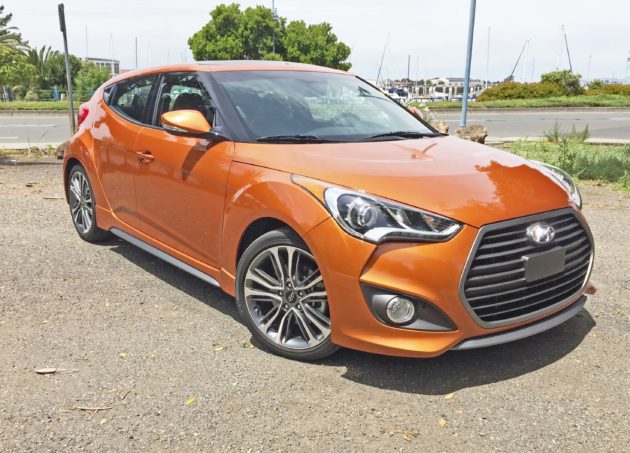
Hyundai is all about producing new products with customer appeal. The Korean automaker continues to roll out innovative vehicles, and perhaps one of the most unique to appear, was when they introduced the unique Veloster back in 2012 The Hyundai Veloster was and still is a three-door asymmetrical coupe that features a rear hatch with a single door on the driver?s side and two conventionally opening doors on the passenger side with the rear door actually hidden. It was designed to be a ?gateway halo? or entry level vehicle for the brand. The new 2017 Hyundai Veloster Turbo features the same design form.
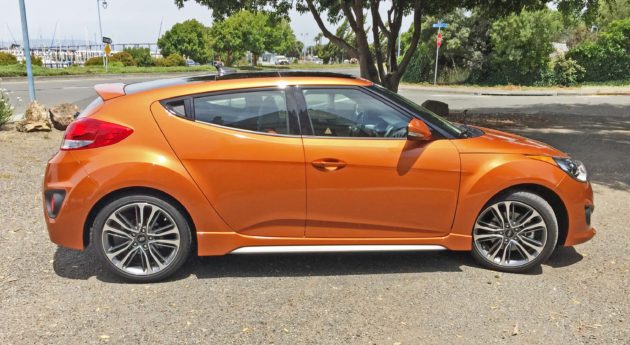
Not only was it unique in its styling and functional attributes, there were a host of advanced technologies on board, all included in a value laden package, and Value seems to be a key word in Hyundai?s vehicle portfolio. The Veloster features Hyundai?s BlueLink communications system with info provided on a 7-inch screen.
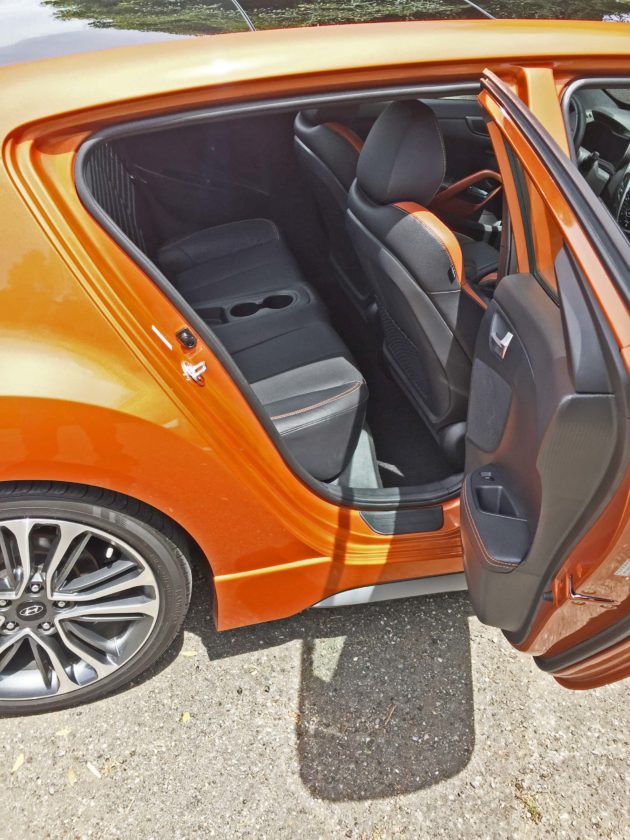
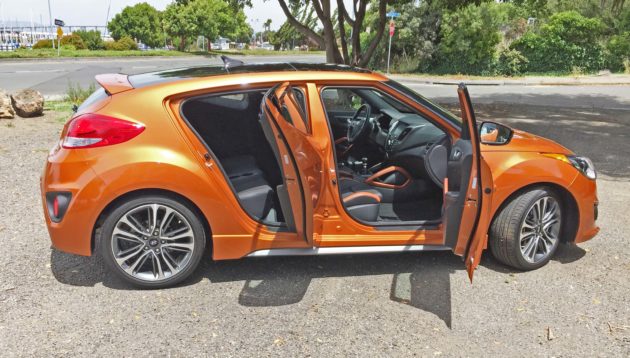
While it is a three-door hatch coupe in right-hand drive markets, the passenger door will move from the right side to the left. Veloster comes with Hyundai?s bold signature hexagonal grille; LED headlight accents and black ?A?-pillars that tend to simulate a motorcycle visor. Hyundai?s ?Fluidic? sculptured lines join athletic, pronounced wheel arches fore and aft, body-color door handles and mirrors, as well as wraparound headlights and available, 18-inch alloy wheels all combining and adding to the unusual coupe?s sporty exterior image. Piano black accents complement the front-end look.
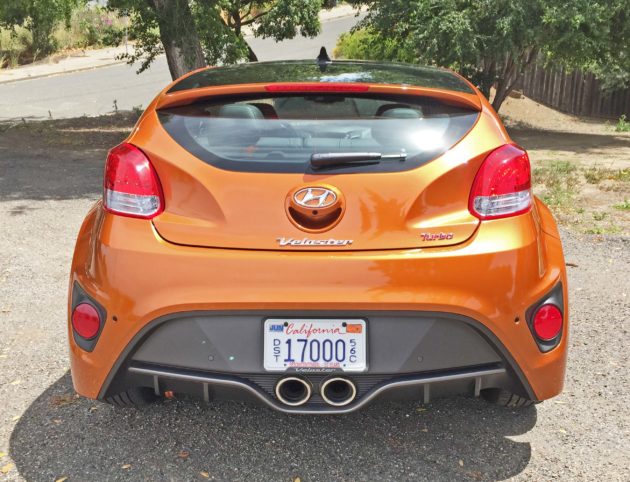
A unique rear glass hatch with an integrated rear spoiler is set inboard of the wraparound tail lamps. The rear also features a blacked out diffuser with centered dual chrome tip round exhaust outlets. A backup camera and backup warning sensors are optionally available. The Turbo version features the same wheelbase as the regular Veloster but is 1.2-inches longer and .6-inches wider. The Grille and front fascia are Turbo specific.
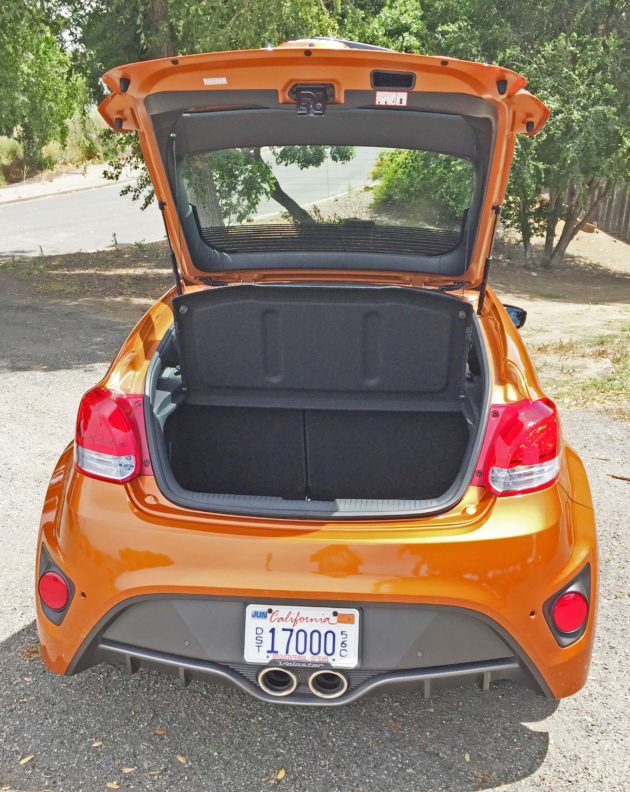
Moving to the inside, the interior design drew its inspiration from sport motorcycles, with the dynamic center fascia taken from the tank, the air vent design drawn from mechanically styled, wide mufflers, while the floor console delivers a sporty and sleek profile. Additionally, there?s a 7-inch Multimedia touch screen, a technical, non-reflective grain on the IP, and stylish, silver-colored grab handles and other trim accents.
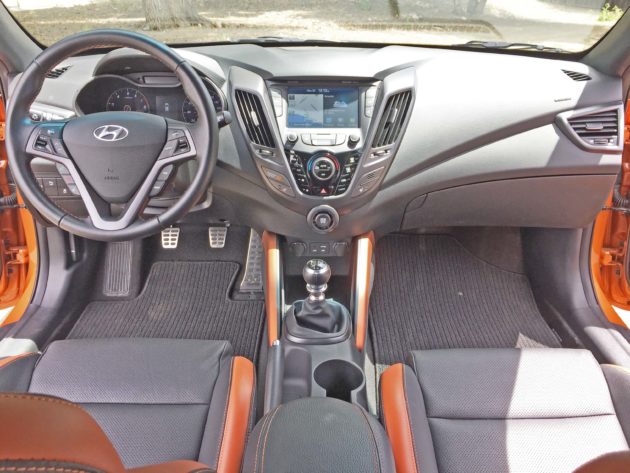
A proximity key with push-button start is available as is body color and black combination seating. Innovative storage abounds with front map pockets with bottle holders, overhead sunglass storage, front and rear cup holders with storage consoles, a dual-tiered armrest storage box, front seatback storage pockets and front and rear armrest storage pockets. There are two levels of audio systems as well, with Gracenote technology and Pandora. There?s also Bluetooth with voice recognition, cruise control and steering wheel audio controls. A spacious 15.5 cubic-feet of cargo space resides beneath the hatch.
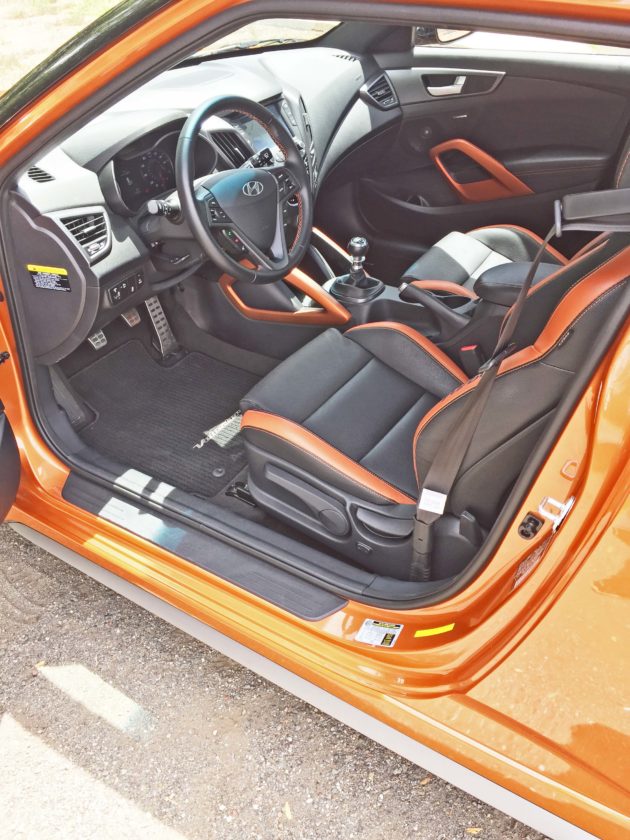
Power for the 2017 Veloster Turbo model is delivered by a 1.6-liter, DOHC D-CVVT (Dual Continuously Variable Valve Timing) GDI (Gasoline Direct Injection) four-cylinder engine with a twin-scroll, intercooled turbocharger.
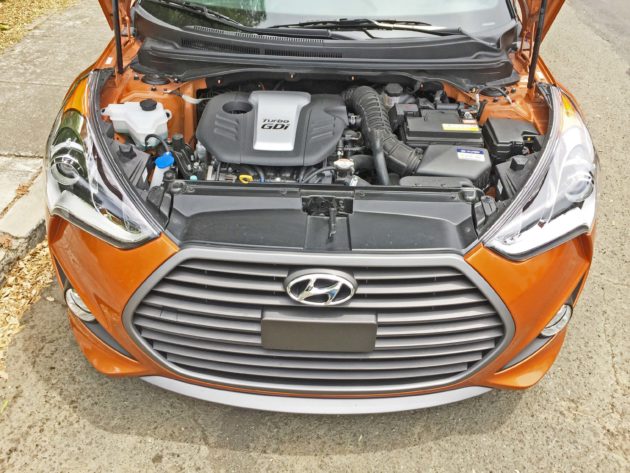 The transversely mounted front mill produces 201 horsepower at 6,000 rpm along with 195 pound feet of torque at 1,750 rpm. Energy is geared to the front wheels via either a six-speed manual gearbox with a dry single plate clutch with diaphragm and an EcoShift indicator, or a six-speed EcoShift DCT automatic transmission with steering wheel mounted paddle shifters, a SHIFTRONIC? manual shift mode and torque converter.
The transversely mounted front mill produces 201 horsepower at 6,000 rpm along with 195 pound feet of torque at 1,750 rpm. Energy is geared to the front wheels via either a six-speed manual gearbox with a dry single plate clutch with diaphragm and an EcoShift indicator, or a six-speed EcoShift DCT automatic transmission with steering wheel mounted paddle shifters, a SHIFTRONIC? manual shift mode and torque converter.
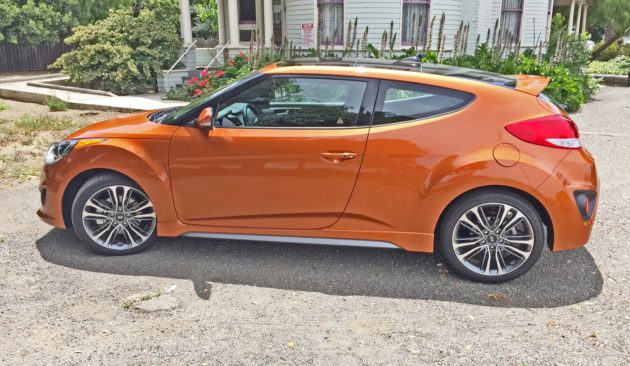
My test 2017 Veloster Turbo (there?s also a naturally aspirated model available) with considerably fewer horses came with a Vitamin C (Orange) metallic exterior finish and a Black interior with Orange accents. The base sticker read $22,600., which rose to $26,260. After adding: the Tech Package, carpeted floor mats and the Inland Freight and Handling Charge.
Safety features for the Veloster Turbo include: The Veloster provides an impressive array of safety features, including: six airbags, Vehicle Stability Management, Electronic Stability Control with integrated Traction Control, Hillstart Assist Control (DCT only), ABS with EBD and Brake Assist.
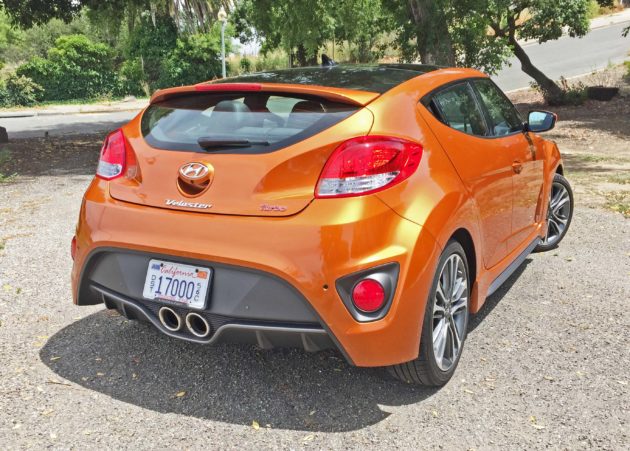
SUMMARY: The 2017 Hyundai Veloster Turbo represents an incredible value in a compact vehicle that is not only innovative, but displays an extremely, (even if somewhat radical) appeal in its appearance, especially from the rear and side views. It comes with an almost unbelievable inventory of standard features and technology, while offering an impressive array of option packaging that provides enhancements for personalization desires and requirements.
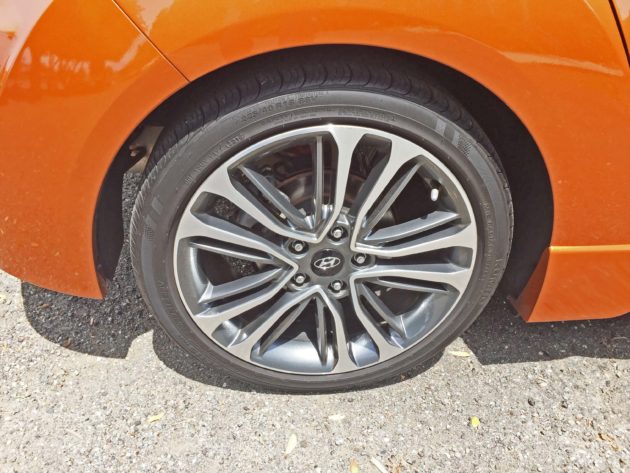
The ride quality is compliant, even with the optional 18-inch wheels and tires, and the handling characteristics are sporty indeed. The power that?s put out by the 1.6-liter four-cylinder turbocharged motor is decidedly more than adequate, now and should satisfy those with the need for more speed. The non-turbo was fun to drive, but the Turbo is superior. The only negative is the rear seat access and room for tall individuals.
Bottom Line, the newest Hyundai Veloster Turbo is a most impressive compact vehicle that?s sure to fill the bill for those consumers shopping for a sporty, yet economic, compact and technologically innovative vehicle, and its price is quite reasonable considering the content level. The Turbo model definitely ups the ante in the performance department with sport-tuned steering and suspension
SPECIFICATIONS: 2017 Hyundai Veloster Turbo
Base Price: $22,600.
Price as Tested: $26,260.
Engine Type and Size: 1.6-liter Gamma, DOHC D-CVVT (Dual Continuously Variable Valve Timing) GDI (Gasoline Direct Injection) four-cylinder with a twin-scroll, intercooled turbocharger.
Horsepower (bhp): 201 @ 6,000 rpm
Torque (ft./ lbs.): 195 @ 1,750 rpm
Transmission: Six-speed manual with dry single plate clutch with diaphragm or six-speed gate type automatic with steering wheel mounted paddle shifters and torque converter.
Drive Train: Transversely mounted front engine / Front- wheel drive.
Suspension: Front – Independent, MacPherson struts with coil springs, gas-filled hydraulic twin-tube shock absorbers, and 23mm stabilizer bar.
Rear – Coupled torsion axle with coil springs, gas-filled hydraulic monotube shock absorbers 23mm V-torsion beam with coil springs and gas-filled hydraulic monotube shock absorbers.
Brakes: Power-assisted four-wheel discs (vented front), four-wheel/four channel ABS, and EBD.
Tires: Kumho Solus T31 ? P225/40 R18 mounted on five-polished-?V?-spoke outer and 5?V? smaller dark painted inner ?V?-spoke alloy wheels.
Wheelbase: 104.3 inches
Length Overall: 167.3 inches
Width: 71.1 inches
Height: 55.1 inches
Turning Circle: 34.12 feet
Curb Weight: 2,877-2,932 lbs
Fuel Capacity: 13.2 gallons
EPA Mileage Estimates: 25 mpg city / 33 mpg highway
Drag Coefficient: 0.33
0 – 60 mph: Not tested.
 Arv Voss is a Northern California based freelance motoring Journalist and member and past officer of several noted Automotive Journalist organizations who contributes regularly to a number of national and international media outlets. He reviews not only cars, trucks and SUVs, but motorcycles and unusual wheeled vehicles as well.
Arv Voss is a Northern California based freelance motoring Journalist and member and past officer of several noted Automotive Journalist organizations who contributes regularly to a number of national and international media outlets. He reviews not only cars, trucks and SUVs, but motorcycles and unusual wheeled vehicles as well.








